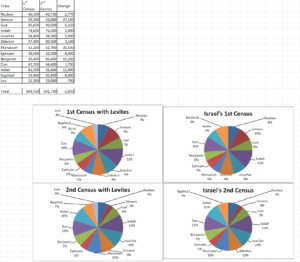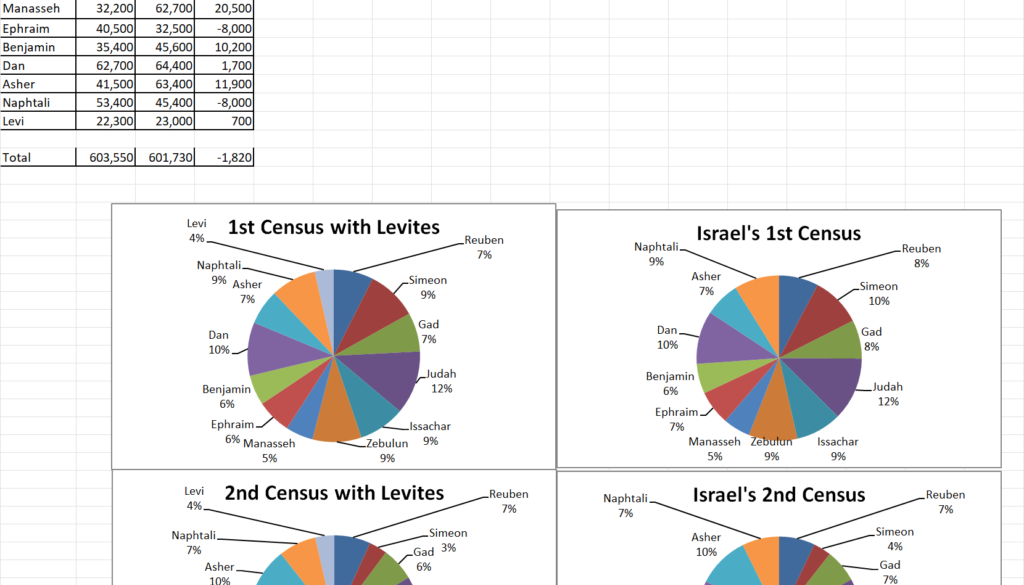Numbers 26 The Recount

After the people completed the Tabernacle, God told Moses to take a census. Now God calls for the recount of who is left. Two of those 20 and above remain from the first census.
After 40 years in the wilderness, many plagues, and God’s judgments, the first generation to leave Egypt is gone. Eleazar, Joshua, Caleb, and Moses remain. Joshua and Caleb were listed in the regular census. Moses and Eleazar were in the census of Levi. Everyone else was either born in the 40-year period, or under the age of 20 at the time of the exodus. That generation angered God so much that He told them they would die in the wilderness and their children would inherit the promise.
The census of the Levites included every male from a month old and above. The names of those under 20 years of age would appear again when they were counted a second time. The regular census had only Caleb and Joshua left from the original names. The tribal and clan names didn’t change though. Let’s join that new generation as they number themselves and prepare to receive God’s promise.
♥ ♦ ♥
The plague is over. There are no more men who consorted with the women of Midian and Moab left alive. Their bodies are barely disposed of before the Lord speaks to Moses about the people. Eleazar is present at the time, and he hears the Lord’s voice too.
“Take a census of all the congregation of the people of Israel, from twenty years old and upward, by their fathers’ houses, all in Israel who are able to go to war.” (Numbers 25:2)
Moses is excited to see how the numbers have grown and changed. He knows the Lord is waiting until the first generation is all dead before He brings the people in. As God is a better keeper of the records than he is, Moses believes that the call for a new census signals the passage of all those who would be in that original generation. All except for himself, Eleazar, Caleb, and his right-hand man Joshua.
“It’s time to call the congregation together” Moses tells Eleazar.
Eleazar bows his head and goes to retrieve the silver trumpets. Eleazar and his son Phinehas sound the trumpets, calling the people to assemble. Moses and the two men wait as the people gather before the door of the Tabernacle. Once everyone is present, and quiet, Moses sets out the command of the Lord for the people.
“The Lord has called us to take another census of the people. We will conduct it in the same manner as the previous time. The Levites will not be recorded in this census, so they will assist with making the official record. I need the heads of each tribe to move forward and stand in front of me.
The leaders of the tribes begin to make their way through the crowd. People move aside as they try and pass. Withing moments, all the tribal leaders are standing before Moses; one from each tribe.
“Each of you will gather those of your tribe and record their names. All those who are 20 years of age and above will be included.” Everyone stands there, still looking at Moses. Finally, he says, “You may begin.”
The leaders begin to disperse and call the people to themselves.
“Reuben, over here” the leader of Reuben calls from under a large tree.
“Benjamin this way!”
“Judah, meet at the edge of our camp.”
After Judah’s announcement, all the others think this would be a good place for this process, so all groups move to the edge of their place within the camp.
With the help of the Levites, the counting takes only one full day. By nightfall, the last of the scrolls are being gathered and banded together by tribe. These are then taken by each leader to Moses. As some tribes have fewer numbers, their scrolls were brought to Moses earlier than the largest tribes. Simeon had finished first and Judah was the last to complete their numbers.
The tabulation of each tribe’s scrolls would begin in the morning. Everyone was tired. Moses kept the records safe in his tent until then.
Moses walks the short distance from his tent to the Tabernacle when the sun first sends out its rays to welcome the day. He sees Eleazar preparing the morning sacrifice. He stands quietly by as Eleazar completes the task. Once Eleazar is done, Moses walks over to join him.
“I never tire of seeing the Lord’s offerings being brought before Him.”
“Nor do I my lord Moses.”
The two stand in companiable silence for a few minutes, inhaling the aroma of the sacrifice. After a bit, Moses drags his attention away.
“We need to tally the scrolls.”
“I remember you asking for assistance the last time the Lord called for a census. Would you like the same assistance as last time?”
“Yes, please. It would be most appreciated.”
Within the hour, there were 12 Levites standing outside Moses’ door. “Eleazar sent us to help with tallying the records” the leader of the group said.
Moses bows his head in acceptance of their help, then goes back inside his tent. He emerges moments later with several scrolls tied together. After the first man took the bundle from Moses’ arms he hurries back into his tent and retrieves the next bundle. The second person gets this bundle, and so on until all the bundles have been distributed. The tally can now begin.
Two days later, the final numbers were ready to present to the people. Before Moses does this though, he calls for a renumbering of the tribe of Levi. He wants all the information to be complete before he reveals all the numbers ready before presenting them to the people. Two days later, the Levites have been numbered too.
Moses watches Eleazar perform the morning sacrifice again. When Eleazar is finished, he joins Moses at the door of the Tent of Meeting.
“I remember watching your Abba offer the sacrifice. He would be proud of how you handle the work of the Lord.”
“Thank you, my lord. It is an honor to have been chosen by God for such a task.”
“It is at that” muses Moses. “It’s time to call the people together so that they may hear the numbers.”
Eleazar retrieves the trumpets again and tasks one of the Levites serving in the Tabernacle that morning to help him blow them. They all watch as the people begin to assemble. When all are ready, Moses steps forward to address them.
“We have completed the census and tallied the names. I will read these to you.”
Moses pulls from his robe the list containing the count.
“The tribe of Reuben has a count of 43,730 men ready for battle. Reuben’s tribe carries the weight of Korah’s rebellion, as two of the tribal leaders were from his ranks. Those men were swallowed alive by the earth.”
Silence reigns in the congregation as they remember this sin.
“The tribe of Simeon presents a count of 22,200 men ready for war. Simeon’s tribe has suffered the largest decrease in number of any tribe. It may be due to their men having conspired with the women of Moab and Midian more than any other. Zimri, who was also associated with Korah’s rebellion, was the one whom Phinehas pieced through with the spear after he brought a woman from Midian into the camp.”
The leaders of the clans of Simeon bow their heads in recognition of the cost of sin.
“The tribe of Gad numbers at 45,000 men ready for war. His numbers have decreased a little.”
Moses looks at his list again and continues. “The tribe of Judah’s numbers ready for war is 76,500. His numbers have increased since the last census. The tribe of Issachar has also increased with a new number of 64,300. The tribe of Zebulun numbers 60,500 men ready for war. This is also an increase in number.”
Moses shuffles his papers before proceeding. “The tribe of Manasseh has the largest increase. Their numbers ready for war today are 62,700. Ephraim now holds 32,500. His losses now place him one above the smallest of all the tribes.”
Moses looks around to see that all the people are still with him. “Benjamin’s numbers have increased to 45,600, while The tribe of Dan has increased to 64,400 men ready for war. Asher’s numbers have increased to 63,400. And the tribe of Naphtali has decreased, bringing their number to 45,400.”
Moses shuffles his papers one last time. “The tribe of Levi is not included in the official census either time, but his rolls are numbered. At this time, numbering all males from one month old and above, his numbers are 23,000. All told, our numbers have decreased by 1,820 souls. Our total is 601,730.”
Moses lets this all sink in for a minute before continuing. “The Lord swore to us that those who were numbered in the first census would NOT be going into the Promised Land. Because of their sin, they would die in the wilderness. All that is except for Caleb and Joshua. The census completed, and shared with you today, carries NONE of the names of the first census, except for those two faithful men.”
Moses looks around at the people as they realize the meaning of this. The Lord could fulfill His promise at any time now!
“When you enter the land that the Lord has promised, it will be divided amongst you by tribe and clan. The larger tribes will have larger portions, and the smaller tribes, smaller portions. And you will draw lots for your portions throughout the land. But we will not set even one foot in the direction of the Promised Land until the Lord tells us to do so.”
When the crowd broke up, Moses thought about the rolls. And he knew there was one more name that God said would be removed before the people crossed over into the promise that the Lord had given them. His name was still to be stricken, for he had sinned at the waters of Meribah. He is praying that the Lord will change His mind on this.
(to be continued)
The oldest person going into the Promised Land is 59 plus a few months. They would have been at most 19 and less than one month old when Israel crossed the Red Sea. We are actually 40 years and eleven months at this point. The total number of years between Egypt and Canaan is 41. The count started after the first attempt to enter was rejected by the people. And the first census wasn’t taken until they were in the wilderness for 11 months. Their name couldn’t have been listed in the first census and live to enter the land.
So near and yet so far!
THANK YOU, FATHER GOD, for forgiveness! Thank You that You love me still, even when I fall flat on my face into sin. Only You can redeem me. How many of that first generation were forgiven their sins while in the wilderness? How many of them turned to You fully? No matter what though, the consequences for their actions was irrevocable. Moses’ was too.
You have protected me SO MANY TIMES from consequences I rightly deserve. I’m MORE than grateful for that! Keep me in Your will Father God. I don’t want to wander off and run into dire consequences of my own making.



